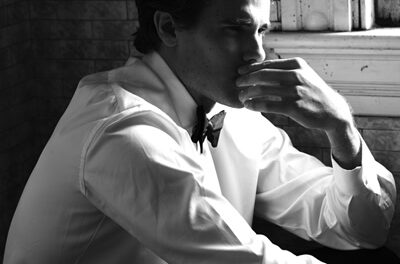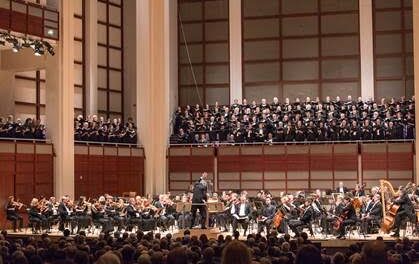Unlike Milton Nascimento, the first artist featured in Duke Performances‘ series marking fifty years of Bossa nova, guitarist Romero Lubambo is not a household word. Indeed he is probably known only to the most erudite of the cognoscenti, and even then, not as a solo performer or the name on the marquee. Lubambo is a native Carioca; he was born and raised in Rio de Janeiro but left Brazil at age thirty for New York, following the wisdom, repeated by Tom Jobim, that the best solution for the Brazilian musician is Rio’s Galeão airport. Since then, his jazz guitar has been an important part of the Manhattan scene. He was one of three guitarists to appear on the disc of Brazilian Duos recorded a few years back by fellow expat and New Yorker Luciana Souza, heard last season at Duke.
I am not a fan of the Nelson Concert Room, but you could tell something was up from the moment you walked into the space prior to Lubambo’s program. The guitarist’s chair was placed by the entrance, with the chairs rearranged in a u-shape around the artist, and the closest about a foot away. No distance between art and life here. When Lubambo appeared, he greeted Brazilian friends, sat down, and welcomed the audience to a program that felt as if it might have been in his living room. He played a baker’s dozen of tunes, only a few of them recalling the Bossa nova, and all of them in a style uniquely his own, combining the lyricism of Brazilian music with a density of invention and chromaticism drawing from American jazz.
He began the program with “Batida diferente,” a Bossa standard, but not from the Jobim songbook, and followed it with “A cor do pecado” (“The color of sin”), a samba from 1939, by Bororó, which Lubambo told us he had loved since his mother sang it for him when he was a child. Next up was “Café,” by Egberto Gismonti, and then two songs of his own composition, “Song for Caia,” a lyrical number written for his niece, and “Song for Flavio,” a baião in honor of his father. The latter, drawing on the folk traditions of the state of Pernambuco, was one of the peaks of guitaristic virtuosity, with flurries of notes filling out its modal melodies and harmonies.
The classic “Insensatez” by Jobim which followed was perfect in its contrast and heartbreaking transparency. After a very brief “Samba Novo” (Baden Powell) came a Mancini tune familiar only to the very oldest in the audience, “Days of Wine and Roses,” and finally one of the tops of the Bossa nova, the “One-Note Samba.” “Nature’s Beauty,” by Lubambo for his daughter, was a very sad samba. The program closed with three familiar numbers – the “Trenzinho Caipira” by Villa-Lobos, “Corcovado” (Jobim), and “Influencia do Jazz” (Carlos Lyra). The audience, on its feet, demanded an encore. Lubambo offered “a little tune I just wrote…,” and after some diversionary tactics, made his way into “Girl From Ipanema.”
This was an evening that those present will long remember, both for Lubambo’s musical genius, and for his charming and welcoming presence.












